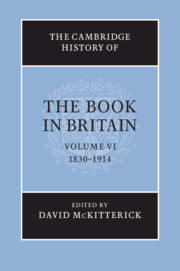Book contents
- Frontmatter
- Introduction
- 1 Changes in the look of the book
- 2 The illustration revolution
- 3 The serial revolution
- 4 Authorship
- 5 Copyright
- 6 Distribution
- 7 Reading
- 8 Mass markets: religion
- 9 Mass markets: education
- 10 Mass markets: children’s books
- 11 Mass markets: literature
- 12 Science, technology and mathematics
- 13 Publishing for leisure
- 14 Publishing for trades and professions
- 15 Organising knowledge in print
- 16 The information revolution
- 17 A place in the world
- 18 Second-hand and old books
- 19 A year of publishing: 1891
- 20 Following up The reading nation
- Bibliography
- Index
- Plate Sections
- References
16 - The information revolution
Published online by Cambridge University Press: 28 March 2010
- Frontmatter
- Introduction
- 1 Changes in the look of the book
- 2 The illustration revolution
- 3 The serial revolution
- 4 Authorship
- 5 Copyright
- 6 Distribution
- 7 Reading
- 8 Mass markets: religion
- 9 Mass markets: education
- 10 Mass markets: children’s books
- 11 Mass markets: literature
- 12 Science, technology and mathematics
- 13 Publishing for leisure
- 14 Publishing for trades and professions
- 15 Organising knowledge in print
- 16 The information revolution
- 17 A place in the world
- 18 Second-hand and old books
- 19 A year of publishing: 1891
- 20 Following up The reading nation
- Bibliography
- Index
- Plate Sections
- References
Summary
Introduction
The Victorians knew they were living through a time of transformation in the provision of information. As one author put it in 1853, ‘The age in which we live, is unprecedented for the cheapness and abundant supply of its literature.’ ‘Huge costly tomes’ had been replaced by ‘the small and low-priced volume which is accessible to all’. Literary reviews in the 1850s were full of articles headed ‘Cheap literature’, ‘New and cheap forms of literature’ and ‘Reading for the million’. The nineteenth century was widely proclaimed as the era of the final perfection of the art of printing from movable types. Thanks to steam-powered printing machines, stereotyping, machine-made paper and machine-made bindings, the Victorians prided themselves on having made print available to the masses.
Anachronistic as it is, the immediate benefit of using the term ‘information revolution’ to describe these changes is that it directs our attention to facts, information and knowledge – or, prosaically, non-fiction. With so many book historians working in literature departments, it is hardly surprising that the impact of the new printing technologies and the growth of new reading audiences have been most extensively sketched out in the realm of literature, whether poetry, drama, novels or short stories. But it was almanacs, spelling books and dictionaries that were the bread-and-butter of publishing, and Simon Eliot’s figures suggest that literature still accounted for only a fifth of all titles published by 1870. This chapter, therefore, seeks to put factual publishing back on the map.
Keywords
- Type
- Chapter
- Information
- The Cambridge History of the Book in Britain , pp. 567 - 594Publisher: Cambridge University PressPrint publication year: 2009
References
- 5
- Cited by



